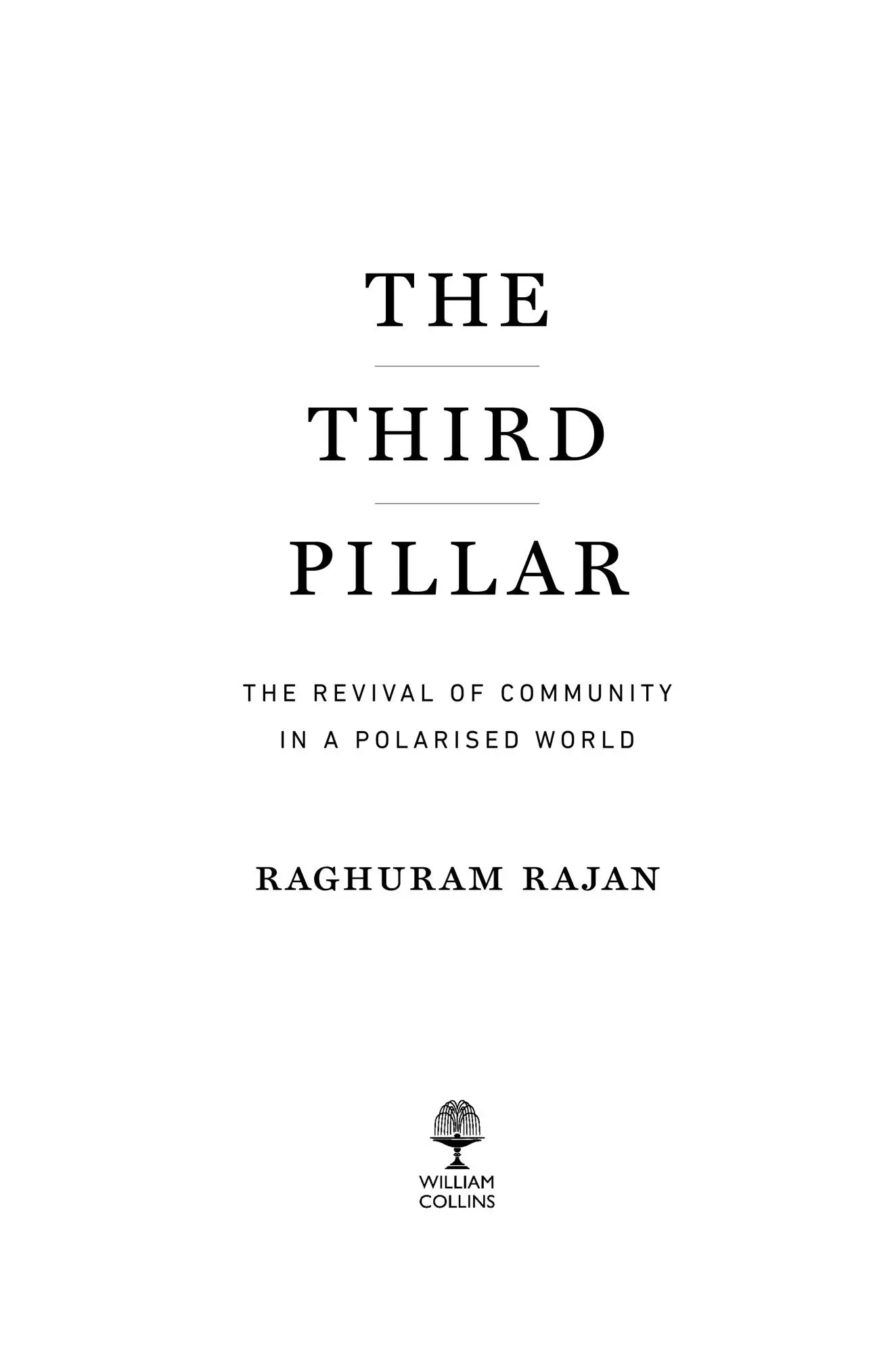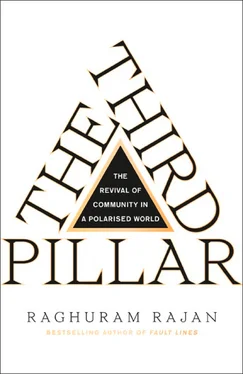
Copyright CONTENTS Cover Title Page Copyright Dedication Also by Raghuram Rajan Preface Introduction: The Third Pillar PART I HOW THE PILLARS EMERGED 1. Tolerating Avarice 2. The Rise of the Strong but Limited State 3. Freeing the Market … Then Defending It 4. The Community in the Balance PART II IMBALANCE 5. The Pressure to Promise 6. The ICT Revolution Cometh 7. The Reemergence of Populism in the Industrial West 8. The Other Half of the World PART III RESTORING THE BALANCE 9. Society and Inclusive Localism 10. Rebalancing the State and the Community 11. Reinvigorating the Third Pillar 12. Responsible Sovereignty 13. Reforming Markets Epilogue Acknowledgments Notes Index About the Author About the Publisher
William Collins
An imprint of HarperCollins Publishers 1 London Bridge Street London SE1 9GF WilliamCollinsBooks.com This eBook first published in Great Britain by William Collins in 2019 Copyright © 2019 by Raghuram Rajan Cover design by Jack Smyth Raghuram Rajan asserts the moral right to be identified as the author of this work A catalogue record for this book is available from the British Library All rights reserved under International and Pan-American Copyright Conventions. By payment of the required fees, you have been granted the non-exclusive, non-transferable right to access and read the text of this e-Book on-screen. No part of this text may be reproduced, transmitted, downloaded, decompiled, reverse engineered, or stored in or introduced into any information storage and retrieval system, in any form or by any means, whether electronic or mechanical, now known or hereinafter invented, without the express written permission of HarperCollins Publishers. Source ISBN: 9780008276263 Ebook Edition © February 2019 ISBN: 9780008276294 Version: 2019-02-06
To Radhika
Cover
Title Page
Copyright
Dedication To Radhika
Also by Raghuram Rajan ALSO BY RAGHURAM RAJAN I Do What I Do Fault Lines Saving Capitalism from the Capitalists (with Luigi Zingales)
Preface
Introduction: The Third Pillar
PART I
HOW THE PILLARS EMERGED
1. Tolerating Avarice
2. The Rise of the Strong but Limited State
3. Freeing the Market … Then Defending It
4. The Community in the Balance
PART II
IMBALANCE
5. The Pressure to Promise
6. The ICT Revolution Cometh
7. The Reemergence of Populism in the Industrial West
8. The Other Half of the World
PART III
RESTORING THE BALANCE
9. Society and Inclusive Localism
10. Rebalancing the State and the Community
11. Reinvigorating the Third Pillar
12. Responsible Sovereignty
13. Reforming Markets
Epilogue
Acknowledgments
Notes
Index
About the Author
About the Publisher
ALSO BY RAGHURAM RAJAN
I Do What I Do
Fault Lines
Saving Capitalism from the Capitalists
(with Luigi Zingales)
We are surrounded by plenty. Humanity has never been richer as technologies of production have improved steadily over the last two hundred and fifty years. It is not just the developed countries that have grown wealthier; billions across the developing world have moved from stressful poverty to a comfortable middle-class existence in the span of a generation. Income is more evenly spread across the world than at any other time in our lives. For the first time in history, we have it in our power to eradicate hunger and starvation everywhere.
Yet even though the world has achieved economic success that would have been unimaginable even a few decades ago, some of the seemingly most privileged workers in developed countries are literally worried to death. Half a million more middle-aged non-Hispanic white American males died between 1999 and 2013 than if their death rates had followed the trend of other ethnic groups. 1The additional deaths were concentrated among those with a high school degree or less, and largely due to drugs, alcohol, and suicide. To put these deaths in perspective, it is as if ten Vietnam wars were simultaneously taking place, not in some faraway land, but in homes in small-town and rural America. In an era of seeming plenty, a group that once epitomised the American dream seems to have lost hope.
The anxieties of the moderately educated middle-aged white male in the United States are mirrored in other rich developed countries in the West, though perhaps with less tragic effects. The primary source of worry seems to be that moderately educated workers are rapidly losing, or are at risk of losing, good ‘middle-class’ employment, and this has grievous effects on them, their families, and the communities they live in. It is widely understood that job losses stem from both global trade and the technological automation of old jobs. Less well understood is that technological progress has been the more important cause. Nevertheless, as public anxiety turns to anger, radical politicians see more value in attacking imports and immigrants. They propose to protect manufacturing jobs by overturning the liberal rules-based postwar economic order, the system that has facilitated the flow of goods, capital, and people across borders.
There is both promise and peril in our future. The promise comes from new technologies that can help us solve our most worrisome problems like poverty and climate change. Fulfilling it requires keeping borders open so that these innovations can be taken to the most underdeveloped parts of the world, even while attracting people from foreign lands to support aging rich country populations. The peril lies not just in influential communities not being able to adapt and instead impeding progress but also in the kind of society that might emerge if our values and institutions do not change as technology disproportionately empowers and enriches some.
DISRUPTIVE TECHNOLOGICAL CHANGE
Every past technological revolution has been disruptive, prompted a societal reaction, and eventually resulted in societal change that helped us get the best out of the technology. Since the early 1970s, we have experienced the Information and Communications Technology (ICT) revolution. It built on the spread of mass computing made possible by the microprocessor and the personal computer, and now includes technologies ranging from artificial intelligence to quantum computing, touching and improving areas as diverse as international trade and gene therapy. The effects of the ICT revolution have been transmitted across the world by increasingly integrated markets for goods, services, capital, and people. Every country has experienced disruption, punctuated by dramatic episodes like the Global Financial Crisis in 2007–2008 and the accompanying Great Recession. We are now seeing the reaction in populist movements of the extreme Left and Right. What has not happened yet is the necessary societal change, which is why so many despair of the future. We are at a critical moment in human history, when wrong choices could derail human economic progress.
This book is about the three pillars that support society and how we get to the right balance between them so that society prospers. Two of the pillars I focus on are the usual suspects, the state and markets. Many forests have been consumed by books on the relationship between the two, some favouring the state and others markets. It is the neglected third pillar, the community – the social aspects of society – that I want to reintroduce into the debate. When any of the three pillars weakens or strengthens significantly, typically as a result of rapid technological progress or terrible economic adversity like a depression, the balance is upset and society has to find a new equilibrium. The period of transition can be traumatic, but society has succeeded repeatedly in the past. The central question in this book is how we restore the balance between the pillars in the face of the ongoing disruptive technological and social change.
Читать дальше













